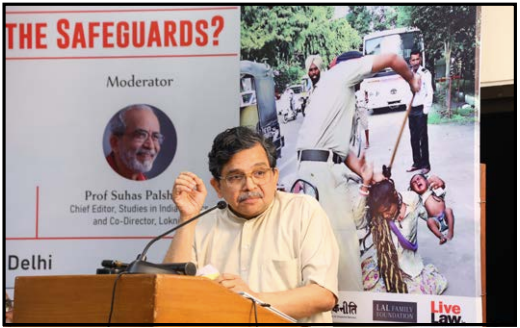Keynote Address by Justice Muralidhar
A Standup Comedy Show Enthrals Audience
Rishikesh Kumar*

“I Am Foxed,” Said the Bear: When Satire Exposes the Brutality of Confession.
It began with laughter. A forest. A fox. A bear. A police competition that sounded absurd—until it wasn’t.
The speaker knew exactly what he was doing. In a room full of legal scholars, activists, students, and policy wonks, he chose satire over statistics, storytelling over speech, and delivered a scathing critique of police torture. It went something like this:
The competing cops were challenged to find a fox in a French forest as fast as possible. The American went in first, mimicked its mating calls, and the fox came running. The French lured the animal in minutes with its scent. Our cops from the sub-continent went in next but weren’t out for eternity. They were busy thrashing a bear to pulp to confess that he was indeed a fox!
As the audience got the chilling metaphor, the laughter grew thinner by the time the bear whispered, “I am foxed”. Confessions mattered more than the facts, he said, “in our real-world forests of law.” What started as a comic tale soon slipped into dark humour at its best!
The opening evoked an applause, but the Justice wasn’t finished: “I Have to Apologise…”
And he continued after a pause:
“I have to apologise. I actually wrote out a detailed keynote address for this event. But at the same time, I was also drafting a letter to my dear friend Justice Ramasubramanian. In a hurry, I seem to have brought the letter instead. With your kind permission, may I read that instead?
The letter (to the Chairman NHRC), of course, seemed to be no mistake. It was another satirical device— pointed, and deeply political
An Open Letter to the NHRC Chair
On institutional decay: : NHRC — From Watchdog to Bystander In his ‘letter’, Justice Muralidhar reflected on the slow erosion of the NHRC. He pointed out that the selection process for the head of the NHRC — intended to be independent and transparent — has increasingly been driven by political favoritism, weakening its credibility. Despite rising cases of custodial violence, bulldozer justice, and unlawful encounters, the NHRC often fails to register or act on complaints. He also underlined the lack of transparency, with crucial custodial death records and CCTV footage kept away from public scrutiny. He warned that without urgent reform, an institution meant to protect rights risks becoming irrelevant — offering neither protection nor accountability.
On torture — Changing Forms, Unchanging Reality Justice Muralidhar brought attention to a harsh truth: police torture has not disappeared — it has merely changed form. Where earlier there was overt physical violence, today more sophisticated psychological methods are used to break individuals, often without leaving visible marks but with devastating effects.
Drawing from the SPIR findings, he outlined, among others, the techniques commonly employed:
Threats of imprisonment under stringent laws
Denial of access to family members, or taking them hostage
Withholding basic needs like food, water, medical care, and toilet access
Forcing acts against an individual’s religious beliefs
Enforced nakedness and verbal humiliation
Justice Muralidhar stressed that these methods are designed to achieve the same old goal — forced confessions and submission — but without physical evidence, making accountability far more difficult.
the NHRC, once a shield for the vulnerable, now seems adrift — losing its voice when it is needed the most. The death of a sanitation worker hardly moves the system, exposing a deeper neglect.
He also warned that this evolution of torture represents a clear defiance of the Supreme Court’s DK Basu guidelines on arrest procedures. While CCTV cameras have been mandated for all police stations, in reality, cameras are often non-functional, poorly maintained, or footage is kept inaccessible, turning a critical safeguard into a mere formality.
In essence, Justice Muralidhar argued, torture has not declined — it has simply learned to hide. Without genuine commitment to transparency and reform, abuses will continue unchecked, buried deeper behind institutional walls.
He highlighted the fact that we often get entangled in reclassifying threats —
Naxals becoming new categories, new dangers being invented, while the everyday citizen, like the sewage worker risking his life daily, remains invisible. He said, the NHRC, once a shield for the vulnerable, now seems adrift — losing its voice when it is needed the most. The death of a sanitation worker hardly moves the system, exposing a deeper neglect.
Challenging the popular slogan “imagine life without police,” Justice Muralidhar flipped the narrative: “If all the sewer cleaners stopped to work, you would have a real health crisis.”
Summing Up
Justice Murlidhar closed the letter that wasn’t with a direct appeal to the NHRC:
“Could you file a report and tell us—how many complaints have you registered? How many prosecutions? How many convictions? And how many have you quietly allowed to disappear?”
In a span of 20 minutes, Justice Murlidhar entertained, exposed, and demanded action.
His message, through metaphor and mockery, was that justice cannot be coerced; confession is not compliance; and silence from institutions meant to protect rights is the loudest indictment of all.
NEXT »



